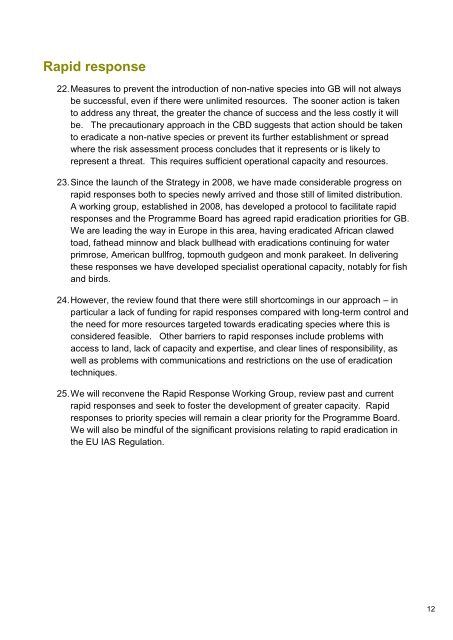The Great Britain Invasive Non-native Species Strategy
gb-non-native-species-strategy-pb14324
gb-non-native-species-strategy-pb14324
You also want an ePaper? Increase the reach of your titles
YUMPU automatically turns print PDFs into web optimized ePapers that Google loves.
Rapid response22. Measures to prevent the introduction of non-<strong>native</strong> species into GB will not alwaysbe successful, even if there were unlimited resources. <strong>The</strong> sooner action is takento address any threat, the greater the chance of success and the less costly it willbe. <strong>The</strong> precautionary approach in the CBD suggests that action should be takento eradicate a non-<strong>native</strong> species or prevent its further establishment or spreadwhere the risk assessment process concludes that it represents or is likely torepresent a threat. This requires sufficient operational capacity and resources.23. Since the launch of the <strong>Strategy</strong> in 2008, we have made considerable progress onrapid responses both to species newly arrived and those still of limited distribution.A working group, established in 2008, has developed a protocol to facilitate rapidresponses and the Programme Board has agreed rapid eradication priorities for GB.We are leading the way in Europe in this area, having eradicated African clawedtoad, fathead minnow and black bullhead with eradications continuing for waterprimrose, American bullfrog, topmouth gudgeon and monk parakeet. In deliveringthese responses we have developed specialist operational capacity, notably for fishand birds.24. However, the review found that there were still shortcomings in our approach – inparticular a lack of funding for rapid responses compared with long-term control andthe need for more resources targeted towards eradicating species where this isconsidered feasible. Other barriers to rapid responses include problems withaccess to land, lack of capacity and expertise, and clear lines of responsibility, aswell as problems with communications and restrictions on the use of eradicationtechniques.25. We will reconvene the Rapid Response Working Group, review past and currentrapid responses and seek to foster the development of greater capacity. Rapidresponses to priority species will remain a clear priority for the Programme Board.We will also be mindful of the significant provisions relating to rapid eradication inthe EU IAS Regulation.12


